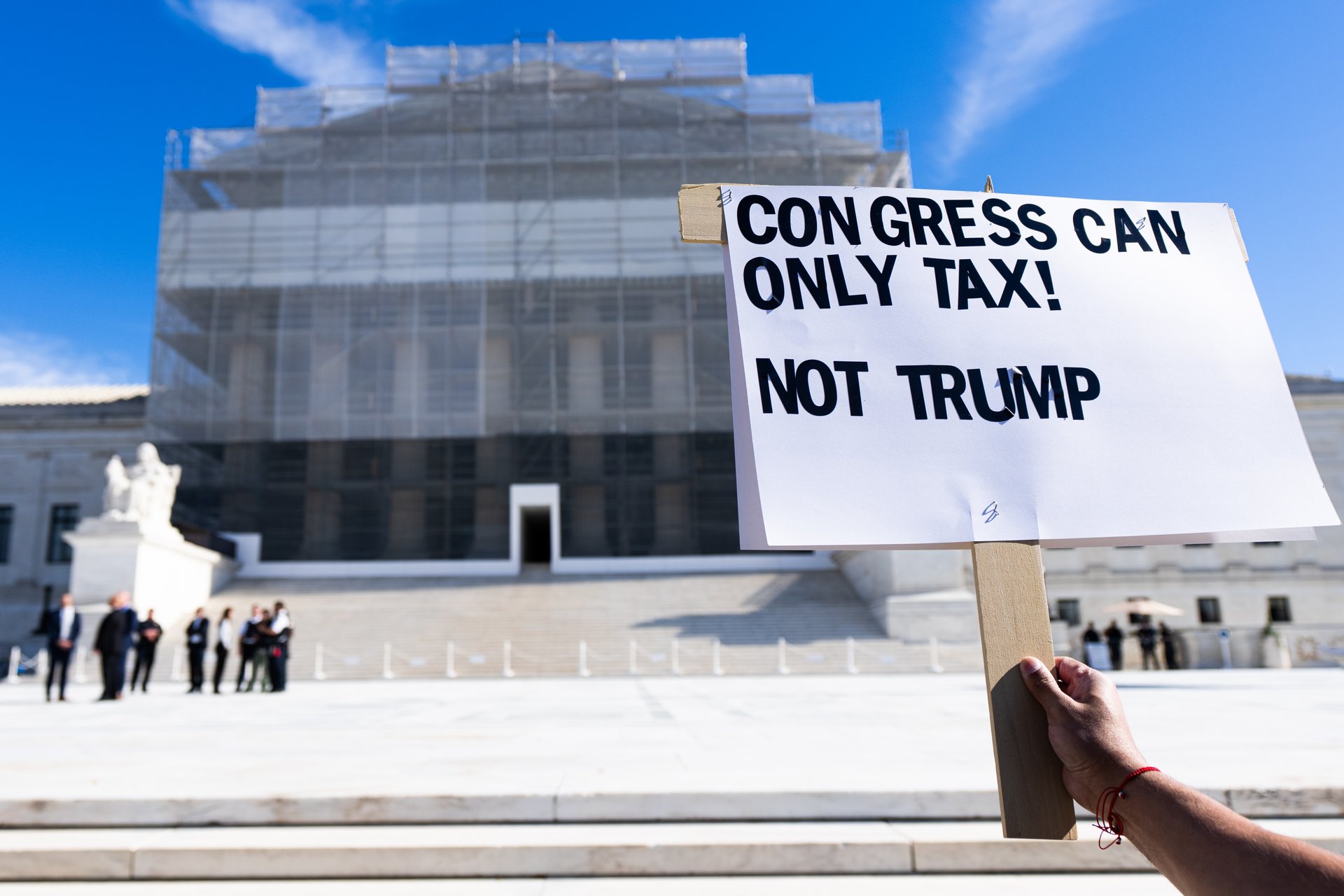Opponents of Trump's tariffs had a good day at the Supreme Court
Supreme Court justices raised sharp questions about Trump's ability to sideline Congress and impose tariffs at his discretion

A protester holds a sign as the U.S. Supreme Court hears arguments on President Trump's tariffs on Wednesday, November 5, 2025. (Bill Clark/CQ-Roll Call, Inc via Getty Images)
For opponents of Trump's tariffs, there were plenty of hopeful signs Wednesday that President Donald Trump's tariffs could get reduced in scope in a future Supreme Court decision within the next few months.
Suggested Reading
Oral arguments stretched for two and a half hours in a consolidated case brought to the high court by two dozen Democratic-led states and a set of private firms. At the crux of the matter is whether President Donald Trump appropriately employed a national emergency law to assign double-digit tariffs on most foreign governments.
Related Content
In its filing, the Trump administration argued it had done so as "large and persistent" trade deficits posed an emergency that justified import taxes.
Yet most Supreme Court justices didn't buy what the administration was selling. Observers of Wednesday's session said many of them raised sharp questions about Trump's ability to sideline Congress and impose tariffs at his discretion.
"If I were the Trump Administration, I'd be burning the midnight oil over the next couple of weeks drawing up tariff backup plans," Peter Harrell, a former Biden administration economist and international trade lawyer, wrote on social media. "A clear majority of the Justices appeared skeptical that IEEPA authorizes the type of broad-based tariffs that Trump has asserted this year."
Solicitor John Sauer argued that Congress did intend to delegate that power to the president under the International Economic Emergency Powers Act, the legal vehicle for the tariffs. But the law never specifically mentions tariffs and no president has employed it as aggressively as Trump has. Justices Neal Gorsuch and Amy Comey Barrett both pressed Sauer on the separation of powers.
“These are kind of across the board," Barrett said. "And so is it your contention that every country needed to be tariffed because of threats to the defense and industrial base? I mean, Spain? France?"
At times, Bauer seemed to contradict the president's own public statements regarding the tariffs. Bauer said they were intended to be "regulatory tariffs" that open up new markets for U.S. companies and were most effective when they weren't paid at all.
Justice Sonia Sotomayor, a liberal justice, pushed back against the argument. “It’s a congressional power, not a presidential power, to tax," she said. "And you want to say tariffs are not taxes, but that’s exactly what they are."
Trump has cast the tariffs as a way to regain U.S. wealth and shrink the national debt. At an event in Florida hours after oral arguments wrapped up, the president boasted that the tariffs were responsible for raising "hundreds of billions of dollars."
"To stake a lot of your argument on saying, 'Well, no, the revenue is just incidental,' that doesn't line up with what was in the brief, or with the way the administration is actually talking about the policy," Erica York, the vice president of federal tax policy at the right-leaning Tax Foundation, told Quartz.
In addition, Sauer acknowledged that Americans paid the tariffs. "Sometimes the foreign producer would pay them. Sometimes the importer would pay the cost," Sauer said. "The importer could be an American, could be a foreign company. A lot of times it's a wholly owned American subsidiary of foreign corporation."
The plaintiffs argued that Trump exceeded his authority in unilaterally designing a new global tariff regime from scratch. "They are tariffing the entire world in peacetime," said Neal Katyal, the lawyer representing the private U.S. companies. "They are asserting a power that no president in our history has had."
The high court did leave plenty of blanks about a future ruling. It's possible the Trump administration could be ordered to pay back at least some of the tariffs it has collected under that law.
Such a decision could go either direction: The high court could compel refunds only for the named plaintiffs in the lawsuit or every U.S. importer that's had to pay import taxes.
